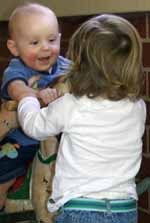 Studies by researchers at Charles Sturt University (CSU) suggest that by the age of nine months, babies are as interested in their peers as they are in their mothers.
Studies by researchers at Charles Sturt University (CSU) suggest that by the age of nine months, babies are as interested in their peers as they are in their mothers.Professor Ben Bradley, a psychologist at the CSU School of Social Sciences and Liberal Studies at Bathurst, said that until very recently, the study of babies' group psychology has been largely neglected.
“No-one has systematically looked at babies in peer-groups until recently. In fact, our method, which examines interactions in groups of three or four babies aged nine months, is the first study to look at all-baby groups,” Professor Bradley said.
“Our research films of all-baby groups suggest that babies are not just adapted to be with their mothers but that they are adapted for group life too.
“We see that babies show group behaviours as they communicate with more than one baby at once, they show jealousy and generous inclusiveness, they develop their own meanings through group interaction, they notice if a group member is behaving differently and they take on roles, such as leader and follower.
“This has important implications for mental health because it shows that how babies behave with their mothers is not the whole story.”
Professor Bradley said that given the intense concentration on infant-mother bonds as the basis for human mental health, the discovery that babies have a group psychology promises to change the way we think about babies’ social abilities and social needs, for example in child care.
“The new view of evolution is that humans developed their big brains in order to deal with the complexities of living in groups, the so-called ‘social brain hypothesis’, and therefore babies are probably born adapted to living in groups,” he said.
“Most studies of babies concentrate on the infant-mother relationship, assuming that is the single foundation for mental health, but babies are constantly involved with people other than their mothers, as well as being involved in groups; families, fathers, siblings, grandparents and friends at child care. Therefore, the ‘mother-baby approach’ needs complementing with a ‘group approach’.
“Psychologists tend to idealise the 'normal' infant-mother bond as entirely positive, but this is contradicted by the facts; babies appear to have a somewhat narcissistic attitude to mothers in the early months. As they get to four and five months old, they sometimes prefer others to mothers.”
This research has been funded by CSU, the University of Western Sydney, and the British Academy. CSU has also received an Australian Research Council (ARC) grant for research to be led by Professor Jennifer Sumsion, from the CSU School of Teacher Education, to examine infant peer groups in long day care and family day care.





Social
Explore the world of social